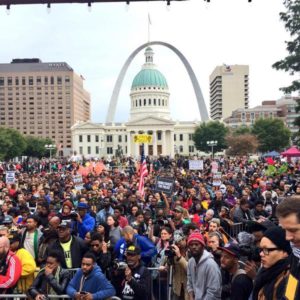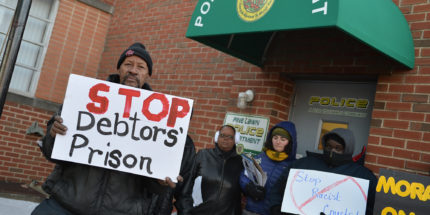The accusations that Ferguson and other towns in St. Louis County have created a revenue-collection system that is jailing large numbers of Black residents for failing to pay fines and fees primarily for traffic violations has culminated in two federal class-action lawsuits filed against Ferguson and Jennings, Mo., by 15 residents who claim the towns have created unconstitutional debtors’ prisons.
The suits, filed in the United States District Court for the Eastern District of Missouri, describe a situation where poor people are jailed because they are unable to pay fines for traffic tickets or other minor offenses, held in jail indefinitely without being given access to a lawyer, threatened and abused by the municipalities until frightened family members could procure enough cash to buy their freedom.
The suits allege they were forced to endure “grotesque” treatment in overcrowded cells for weeks at a time where they were denied access to toothpaste and soap, and were packed on top of each other in cells where the walls are smeared with mucus, blood and feces and they all had to share a single toilet that doesn’t get cleaned. In addition, they were subject to verbal abuse and humiliation by jail guards mocking them for not being able to pay the fines.
The suits say that there have been two suicides in the Jennings jail since 2013.
The lawsuits have been filed on behalf of the plaintiffs by representatives from the Equal Justice Under Law, a nonprofit civil rights organization in Washington; ArchCity Defenders, a nonprofit group in St. Louis; and St. Louis University Law School. They seek to bar the cities from continuing the practices. They are also seeking compensation for people whose rights were violated.
The conditions the plaintiffs describe in the suit sound like something out of a Third World torture facility.
“They are kept in the same clothes for days and weeks without access to laundry or clean underwear; they step on top of other inmates, whose bodies cover nearly the entire uncleaned cell floor, in order to access a single shared toilet that the City does not clean,” the lawsuit against Ferguson alleges. “They develop untreated illnesses and infections in open wounds that spread to other inmates; they endure days and weeks without being allowed to use the moldy shower; their filthy bodies huddle in cold temperatures with a single thin blanket even as they beg guards for warm blankets; they are not given adequate hygiene products for menstruation; they are routinely denied vital medical care and prescription medication, even when their families beg to be allowed to bring medication to the jail; they are provided food so insufficient and lacking in nutrition that inmates lose significant amounts of weight; they suffer from dehydration out of fear of drinking foul smelling water that comes from an apparatus on top of the toilet; and they must listen to the screams of other inmates languishing from unattended medical issues as they sit in their cells without access to books, legal materials, television, or natural light. Perhaps worst of all, they do not know when they will be allowed to leave.”
The Supreme Court has ruled that it is a violation of the constitution to jail people just because they can’t pay a fine.
Ever since Michael Brown was killed in Ferguson by police officer Darren Wilson last August and the community exploded in outrage, Black Ferguson residents have pointed to the debtor prison system as one of the sources of their rage, claiming there was a definite racial angle to the writing of the tickets and imposition of the fines—fines used by these municipalities to keep their budgets afloat.
The ticket system is yet another way that institutional racism often quietly imposes extreme burdens on Black people across the nation, forcing them to deal with excessive amounts of daily stress and strife and endure hidden costs that white people in America often unwittingly escape just because of their skin color.
Though the fines are used by municipalities across the state, Ferguson in 2013 had the highest number of arrests warrants in Missouri relative to its size of 21,000 people—a rate of 1,500 warrants per 1,000 people, according to the New York Times.
Unfortunately these towns in Missouri are in no way an anomaly: a 2010 report by the Brennan Center for Justice at the New York University School of Law found that the practice is common across the United States. The Center examined the practices of the 15 states with the highest prison populations and focused primarily on the proliferation of “user fees”—”financial obligations imposed not for any traditional criminal justice purpose such as punishment, deterrence, or rehabilitation but rather to fund tight state budgets.”
“Many states are imposing new and often onerous ‘user fees’ on individuals with criminal convictions. Yet far from being easy money, these fees impose severe—and often hidden—costs on communities, taxpayers, and indigent people convicted of crimes,” the report states. “They create new paths to prison for those unable to pay their debts and make it harder to find employment and housing as well to meet child support obligations.”
The states studied in the Brennan Center report that utilize these unconstitutional debtors’ prisons are California, Texas, Florida, New York, Georgia, Ohio, Pennsylvania, Michigan, Illinois, Arizona, North Carolina, Louisiana, Virginia, Alabama and Missouri.
The report said African-Americans face a particularly severe burden and are much more likely to be incarcerated.
Though Missouri law bars municipalities from drawing on traffic fines for more than 30 percent of their general operating budgets, municipalities regularly violate the cap.
The lawsuit alleges that while the debtors’ prison system has earned the cities millions of dollars over the past several years, “it has also devastated the City’s poor, trapping them for years in a cycle of increased fees, debts, extortion and cruel incarcerations. The families of indigent people borrow money to buy their loved ones out of jail at rates set arbitrarily by jail officials, only for them later to owe more money to the City of Ferguson from increased fees and surcharges. Thousands of people like the Plaintiffs take money from their disability checks or sacrifice money that is desperately needed by their families for food, diapers, clothing, rent, and utilities to pay ever increasing court fines, fees, costs, and surcharges. They are told by City officials that, if they do not pay, they will be thrown in jail. The cycle repeats itself, month after month, for years.”
The suit tells the egregious tale of plaintiff Keilee Fant, a 37-year-old single mother who works as a certified nurse’s assistant and has been trying to support her family by doing similar work on and off for nearly 20 years. In the past two decades, the City of Ferguson has jailed Ms. Fant more than a dozen times for her inability to make monetary payments on old traffic tickets, even arresting her in October 2013 while she was taking her children to school.
In that case, she was told by Jennings jail staff that she would not be released unless she paid $300. When she informed jail staff she could not afford it, she was let out for three days—and began a “Kafkaesque” journey through the jail systems of St. Louis County, “a lawless and labyrinthine scheme of dungeon-like municipal facilities and perpetual debt.”
Fant wound up being jailed in no less than a dozen towns in the county over the course of weeks, with each town requiring payment for release—only to be swooped up, once she was released, by the next town where she owed fines.
“Demoralized and weary of being transferred from jail to jail, Ms. Fant asked jail staff if they would accept $1,000, which she thought her family could raise from friends and relatives,” the suit says. “The jail officer told her that he wanted to call the Chief of Police to ask if that amount was sufficient. The Chief of Police approved her release if her family could bring $1,000 to the Ferguson pay window, but jail staff told her that she had to get the cash that night or the deal would be off. Her family came to Ferguson and bought her release from the Ferguson jail. She was released from the Ferguson jail immediately after her family paid $1,000. When she was released from the Ferguson jail, she was told by jail staff that she should not go to court and that she did not have any future court dates. Instead, she was told to make cash payments at the Ferguson Police Department. She was told that she would be jailed again if she did not make payments.”
The suit says she was fired from several jobs during these ordeals and had to feed her children using food stamps.
“Similar experiences happened to Ms. Fant more than a dozen times in the past two decades, including one occasion in which she was held in jail by the City of Ferguson for nearly 50 days without a toothbrush, toothpaste, soap, shower, or change of clothes for unpaid traffic tickets because she could not afford to buy her release,” the suit alleges. “During that time, Ms. Fant missed her father’s funeral. On that occasion, the City of Ferguson attempted to bargain with Ms. Fant’s family to get them to pay several thousand dollars to secure her release.”
Fant, a plaintiff in both lawsuit, told the New York Times, “I was bouncing from place to place, and all I could think was: ‘Wait, I’m in here for traffic. I haven’t killed anybody.'”


